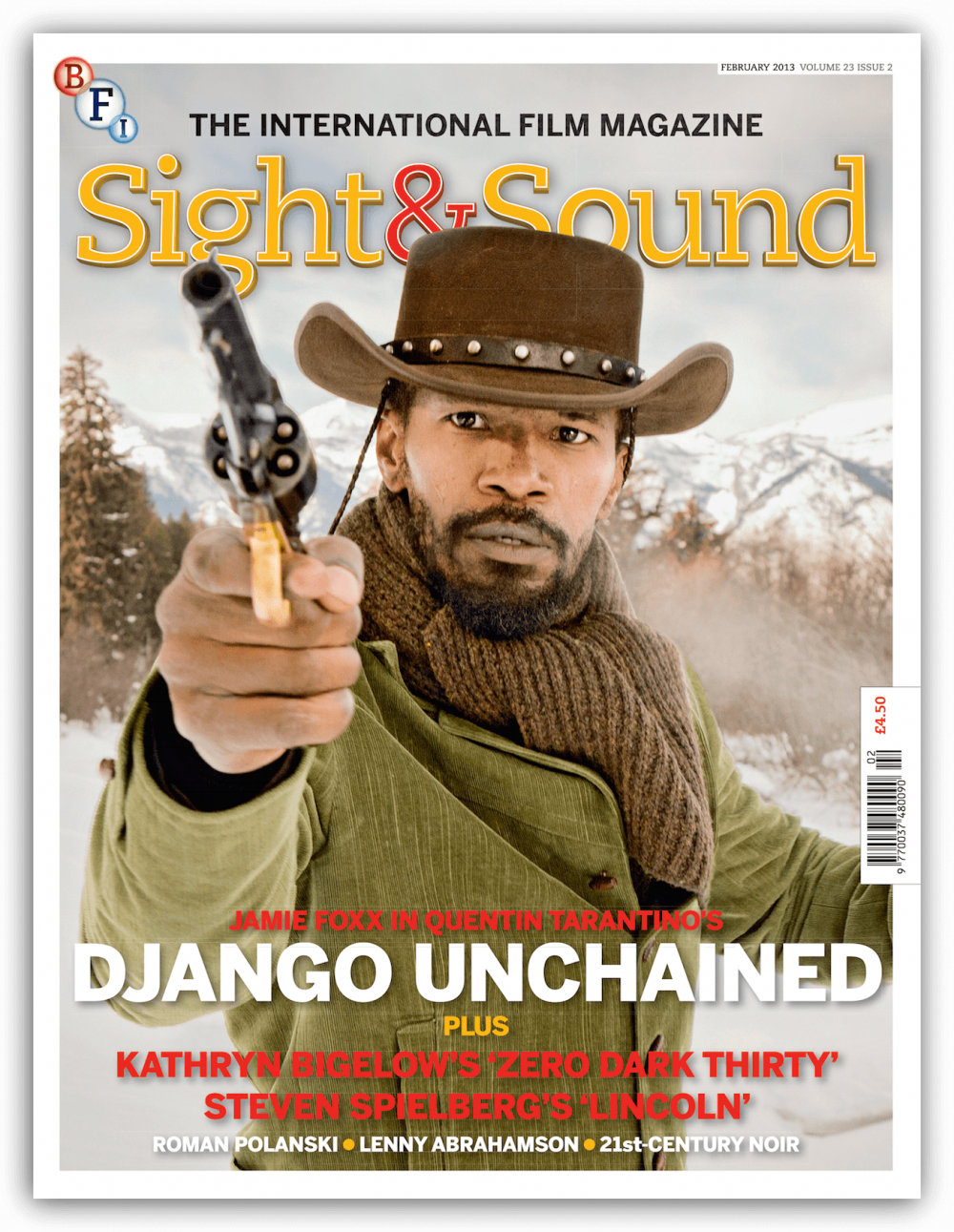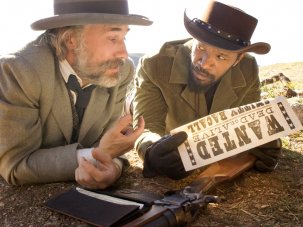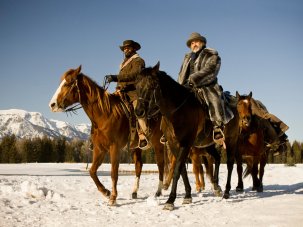
Our February issue comes bulging with controversial takes on American history, recent and not too recent. Our cover star Jamie Foxx is the ex-slave who takes the reins in Quentin Tarantino’s highly entertaining western remix Django Unchained – and turns Eastwood’s Man with No Name on his head with gobbets of Tarantino oratory and humour, as Kim Newman explores.
|
Mailed to subscribers Digital edition available On UK newsstands |
Across the picket fence, meanwhile, Steven Spielberg ventures his first biopic with Lincoln, with Daniel Day-Lewis as the iconic president leading the charge to the abolition of slavery; Graham Fuller ponders the film and its critics. Meanwhile, fast forwarding to 2011, Kathryn Bigelow’s Zero Dark Thirty affects a ‘boots on the ground’ procedural-thriller style in dramatising the hunt for Bin Laden, prompting Michael Atkinson to finger “a kind of all-American sociopathy usually… relegated to game-equipped suburban basements.”
Leaving the American crucible behind, Trevor Johnson talks to Ireland’s great chronicler Lenny Abrahamson about What Richard Did, his new portrait of Dublin’s stockbroker belt. With a major Roman Polanski retrospective underway at the BFI Southbank, Philip Horne essays the director’s command of the grotesque, while Michael Brooke revisits Polanski’s Polish apprenticeship and Charles Barr recounts his collaboration with Kenneth Tynan on 1971’s Macbeth. And in our Deep Focus primer section, Nick James spotlights 12 21st century films noir that revitalise the noir formulae for our new century. And that’s just our features…
-
ZERO DARK THIRTY: Kathryn Bigelow’s drama about bin Laden’s death arrives just 18 months after the event itself. Michael Atkinson asks whether haste has trumped perspective.
-
DJANGO UNCHAINED: Tarantino addresses the vexed subject of American slavery – spaghetti-western style; by Kim Newman. Plus Tim Lucas on the film’s cinematic roots.
-
The queasy trashing of taboos has always laced Roman Polanski’s work, writes Philip Horne. Plus Michael Brook on Polanski in Poland and Charles Barr on his work with Kenneth Tynan.
-
WHAT RICHARD DID: Lenny Abrahamson’s latest delves into the fallout from the demise of the Celtic Tiger, finds Trevor Johnston.
-
LINCOLN: Graham Fuller investigates the position of Steven Spielberg’s first biopic within the director’s oeuvre and examines the range of receptions that greeted its US release, from applause to opprobium.
-
DEEP FOCUS: the crucial elements of film noir – violence, sex, memory and identity – remain as germane to today’s leading filmmakers as to last century’s, argues Nick James.
-
RUSHES: Hollywood’s growth through screwball comedy; American Mary’s Jen and Sylvia Soska; plus Hannah McGill on filmic gender changes and Mark Cousins on the architecture of Amour.
-
THE INDUSTRY: the long gestation of The Liability; the year’s arthouse fortunes; innovative inner-city British comedy Gone Too Far; Russian film ambassador Catherine Mtsitouridze.
-
FESTIVALS: Morelia’s unique charms, plus Rome and Tokyo.
-
WIDE ANGLE: video artist Gerard Byrne; the innovative soundtrack of Performance; the first four-legged film stars; film critic Serge Daney; Seville’s festival of European cinema; films by musicans; Chris Petit’s Chinese Boxes.
-
FORUM: the new currency (and the history) of the newsreel format, with thoughts from three filmmakers embracing its potential.
-
FILMS OF THE MONTH: Antiviral, Bullhead, You Ain’t Seen Nothin’ Yet and Zero Dark Thirty, plus 30 more releases reviewed.
-
HOME CINEMA: René Clément’s early promise; Pathé’s early colour ‘fairy film’ fantasias; Zombie Flesh Eaters, plus 18 more releases reviewed.
-
BOOKS: the loquacious charms of Richard Burton’s diaries; prying the lid off North Korean cinema culture; Taschen’s mammoth tome from the 007 files; a collection of essays on early cinema.
-
ENDINGS: Campbelll Scott and Stanley Tucci’s culinary drama Big Night is about family, food and – as its elegant ending underlines – cinema itself.
Features
COVER FEATURE: Black rider
In Django Unchained the two strands of the spaghetti western – the blood-soaked revenge saga and the jokey pastiche – are twisted together by Quentin Tarantino, with a modern seasoning of racial politics. But unlike Clint Eastwood’s Man with No Name, these westerners talk – a lot. By Kim Newman.
PLUS Tim Lucas on Django Unchained’s roots in a whole range of 1960s and 70s exploitation films dealing with race.
Duty calls
Hollywood didn’t get to grips with the Vietnam War until years after the event. In our rolling-news age, Kathryn Bigelow’s Zero Dark Thirty arrives only 18 months after the bin Laden kill mission it depicts. But is such haste at the expense of perspective? By Michael Atkinson.
Mr freedom
Steven Spielberg’s Lincoln, the story of the president’s struggle to pass the abolition of slavery before the end of the Civil War, has attracted praise in the US – and criticism for its white perspective. But how does the film – the director’s first biopic – fit into the Spielberg oeuvre? By Graham Fuller.
Boom and bust
Lenny Abrahamson’s two critically fêted films Adam & Paul and Garage examined the underside of Irish society. But What Richard Did, the director’s latest, sees him switch his attention to Dublin’s stockbroker belt to reflect on the fate of the Celtic Tiger.
Polanski and the grotesque
Violence and humiliation, sexual excess and transvestism, absurd humour and the transgression of taboos – Roman Polanski’s films, showcased in a BFI Southbank season, are laced with grotesquerie. But their power relies on a carefully crafted sense of reality. By Philip Horne.
PLUS Michael Brook on Polanski in Poland and Charles Barr on his work with Kenneth Tynan.
Deep Focus
21st Century Noir
The crucial elements of film noir – violence, sex, memory and identity – remain as germane to today’s leading filmmakers as to last century’s, argues Nick James.
Rushes
Michael Koresky celebrates the tone of effortless ease at the heart of screwball.
Object Lesson: Hannah McGill on film’s troubled treatment of changes to gender.
First Sight: Anton Bitel talks to Jen and Sylvia Soska about American Mary.
Dispatches: Mark Cousins on the architecture of Amour.
The Industry
Development Tale: Charles Gant on the long gestation of The Liability.
The Numbers: Charles Gant reviews the year’s arthouse fortunes.
How It Works: Ashley Clarke on Gone Too Far, an innovative inner-city British comedy.
Profile: Nick Roddick talks to Russian film ambassador Catherine Mtsitourisze.
Festivals
Nick James on Morelia’s unique charms.
James Benn reports from Tokyo and Simon Merle from Rome.
Wide Angle
Brian Dillon previews the first UK survey of video artist Gerard Byrne.
Soundings: Frances Morgan on the innovative soundtrack of Performance.
Primal Screen: Matthew Sweet pays tribute to the first four-legged film stars.
Gonzalo de Lucas celebrates the heartfelt film criticism of Serge Daney.
Carlos Losilla finds fascinating signposts to new directions at Seville.
Bradlands: Brad Stevens asks what musicians offer when they make films.
Lost and Found: Chris Darke on Chris Petit’s knowing neo-noir Chinese Boxes.
Forum
Kieron Corless investigates the new currency of the newsreel format and hears from three filmmakers embracing its potential: Jem Cohen, Sylvain George and Alex Reuben.
PLUS: Rebecca Vick on the history of the newsreel; Letters.
Reviews
Films of the month
Antiviral
Bullhead
You Ain’t Seen Nothin’ Yet
Zero Dark Thirty
Other new releases reviewed in this issue
American Mary
Ballroom Dancer
Bullet to the Head
Code Name: Geronimo
Django Unchained
Do Elephants Pray?
Everyday
Flight
Hitchcock
The Hobbit An Unexpected Journey
Hyde Park on Hudson
I Give It a Year
I Wish
Jack Reacher
Jiro Dreams of Sushi
The Liability
A Liar’s Autobiography The Untrue Story of Monty Python’s Graham Chapman
Lincoln
May I Kill U?
Midnight Son
Les Misérables
Playing for Keeps
The Punk Syndrome
The Sessions
Song for Marion
So Undercover
UFO
V/H/S
What Richard Did
Wreck-It Ralph
DVD features
Philip Kemp on René Clément’s early promise.
Kate Stables discovers Pathé’s early colour ‘fairy film’ fantasias.
James Blackford has his appetite whetted by Zombie Flesh Eaters.
Plus reviews of
Abraham Lincoln
Les Amants de Montparnasse
Dance Hall
Excision
The Funhouse
In the Mood for Love
Nowhere to Go
Purple Noon (Plein Soleil)
Ramrod, Red Dust
Rosemary’s Baby
Les Soeurs Brontë
Sunday Bloody Sunday
W+B Hein: Materialfilme 1968-1976
Television
Accused
Connie
Luck – Season 1
The Prime of Miss Jean Brodie
Books
Kevin Jackson hails the loquacious charms of Richard Burton’s diaries.
Jasper Sharpe pries the lid off North Korean cinema culture.
Kim Newman assesses Taschen’s mammoth tome from the 007 files.
Ian Christie appraises a collection of essays on early cinema.
Endings
David Jenkins on Big Night.
Further reading
-
The Digital Edition and Archive quick link
Log in here to your digital edition and archive subscription, take a look at the packages on offer and buy a subscription.













